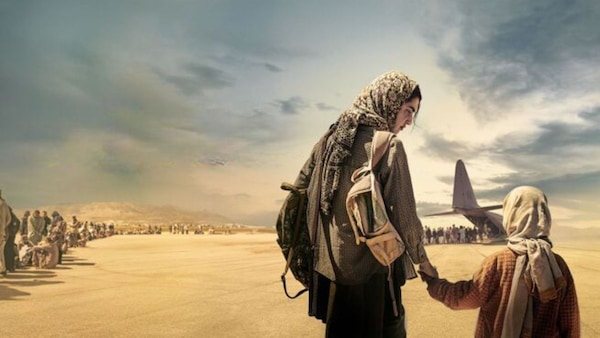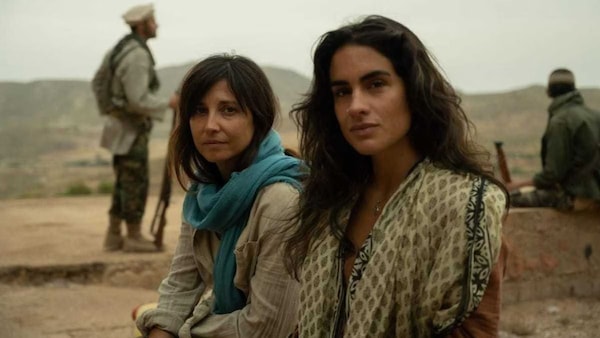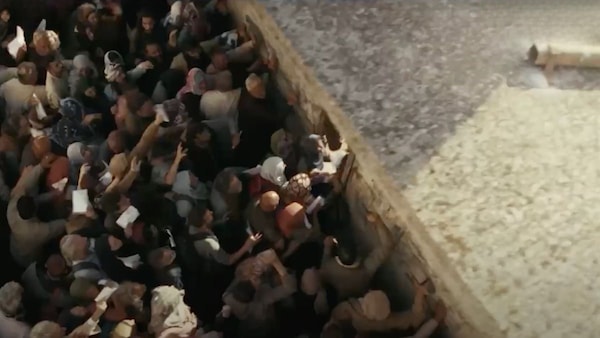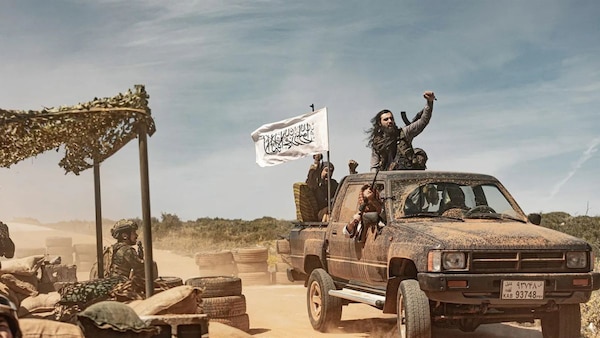Kabul Is A Fascinating Insider’s View Of A Tipping Point In Afghanistan
Kabul evades the temptation to thrill, choosing instead to excavate the human cost of the Taliban’s return to power in a mini-series that is effective, if not exhilarating.

Promo poster for Kabul.
Last Updated: 05.36 PM, Jun 25, 2025
IN THE SECOND EPISODE of Lionsgate Play’s Kabul, a frenzied hospital corridor is suddenly interrupted by gun-toting men of the Taliban regime. Chaos suddenly hits a brick wall as turbaned men, hiding behind scarves, urge the doctors to separate. For a moment, the doctors — especially the women — are confused. What’s happening is unclear. That it will happen is, of course, certain. And then it hits them, these men are separating the women from the men. It’s like watching decades of dogged societal progress shatter under the pressure of a glass wall. The kind whose transparency shocks you into numbness. Civilisations take centuries to build, groom and nourish. Tearing them down takes a day’s stroll. To which effect, this French mini-series, set amid the return of Taliban rule to Afghanistan in 2021, is an elegant, often moving portrayal of the deft procedural nature of conflict.
It’s August 2021, and American troops have decided to withdraw from Afghanistan. The Taliban is returning to power, with an eerie, casual precision. Stuck in the middle of this change of guard is the Nazany family. Zahara (Darina Al Joundi) is a target for the incoming regime because she has tried terrorists as a prosecutor. Her husband, Baqir, on the other hand, is frantically packing things in the dire hope of outrunning the writing on the wall. While Zahara is on a kill list, Baqir is trying to erase his name from his land. Their daughter Amina, a young medic, rather than flee for her life, valiantly wants to hold onto her checkpoint at the hospital. Her brother Fazal, a former security detail, is tasked with a dangerous last-ditch mission. The fame family tree, being incinerated by different dimensions of the same fire.

The Nazany family is pulled apart by the shift in power, without ever being allowed to breathe and contemplate its long-term implications. Unstable states imbue a kind of madness that makes it impossible to detect structure as either a device or a design. The Nazany family’s personal ordeals are therefore intercut with the challenges those in high-end consulates face. The French embassy is a site of uncertainty. “11 men,” a soldier tells a diplomat, is all he can put together as a defence should things come to that. There are other threads — NATO forces hassling with the Americans for supplies, the Taliban imposing a strange sense of calm, with fighting actually relegated to the imagination.
Helmed by Kasia Adamik and Olga Chajdas, Kabul’s strengths are pretty evident. It’s neither the scale, which is impressive in places, nor the thrill-a-minute structure that the 6-episode mini-series chooses to largely evade. It’s the intricacy of its observation, the reliance on human stories as they unfold on the ground, rather than that grand view of churn from a viewpoint well above the people. Stories set in Afghanistan and troubled regions of the Middle East dutifully zoom out to give us the exotic, visual scope of what can often feel like the fetishisation of a distant war. Here, the drama remains intimate, attached to the characters who are faced with difficult choices every step of the way. Amina decides to help a patient on the brink, Fazal chooses the right side of history at great personal cost, as the Nazany family becomes a physiological proof of the multi-dimensional cost of war.

The only thing lacking in Kabul is its ability to actually eke something poetic and momentous out of the ruinous trajectory it sends most of its characters on. Though the changing viewpoints between the insider and the outsider help the show gain balance, it never quite manages to deepen the emotion on either side. We familiarise ourselves with the tempo of haste, but we never get to fully know the people directly impacted by it. That, despite flashbacks and collaborative timelines. That said, the series is fairly attuned to its own mission — to embody turmoil rather than exaggerate it.
WATCH | Rachel Keller's Tokyo Vice, Benedict Cumberbatch's Sherlock, Hailey Kilgore's Power Book 3: Raising Kanan, Sarah Parish's Curfew, Souheila Yacoub's No Man's Land, and more on Lionsgate Play and OTTplay Premium.

Kabul, which hardly features a recognisable face from the world of entertainment, is understated but thoroughly honed and impressively mounted. When artifices like CGI become secondary to the narrative pace and conviction in the story being told, something has gone right. It’s not the most accomplished storytelling, nor told with the verve or manic energy that a Paul Greengrass would have, but it never gives the impression of being bogged down by the pressure to do so either. The writing could have deepened the cuts of this incisive and well-positioned series, but it still takes off well and makes it past most hurdles. Also, for a European production, Kabul isn’t speculative but specific about the people it wants to portray and humanise. Almost like a political act of reconciliation for the wrongs that Western powers have committed on Afghan soil. By failing to nourish it with hope. It’s tragic, insightful and urgent as a contrasting image to US-spawned jingoism in the region.
